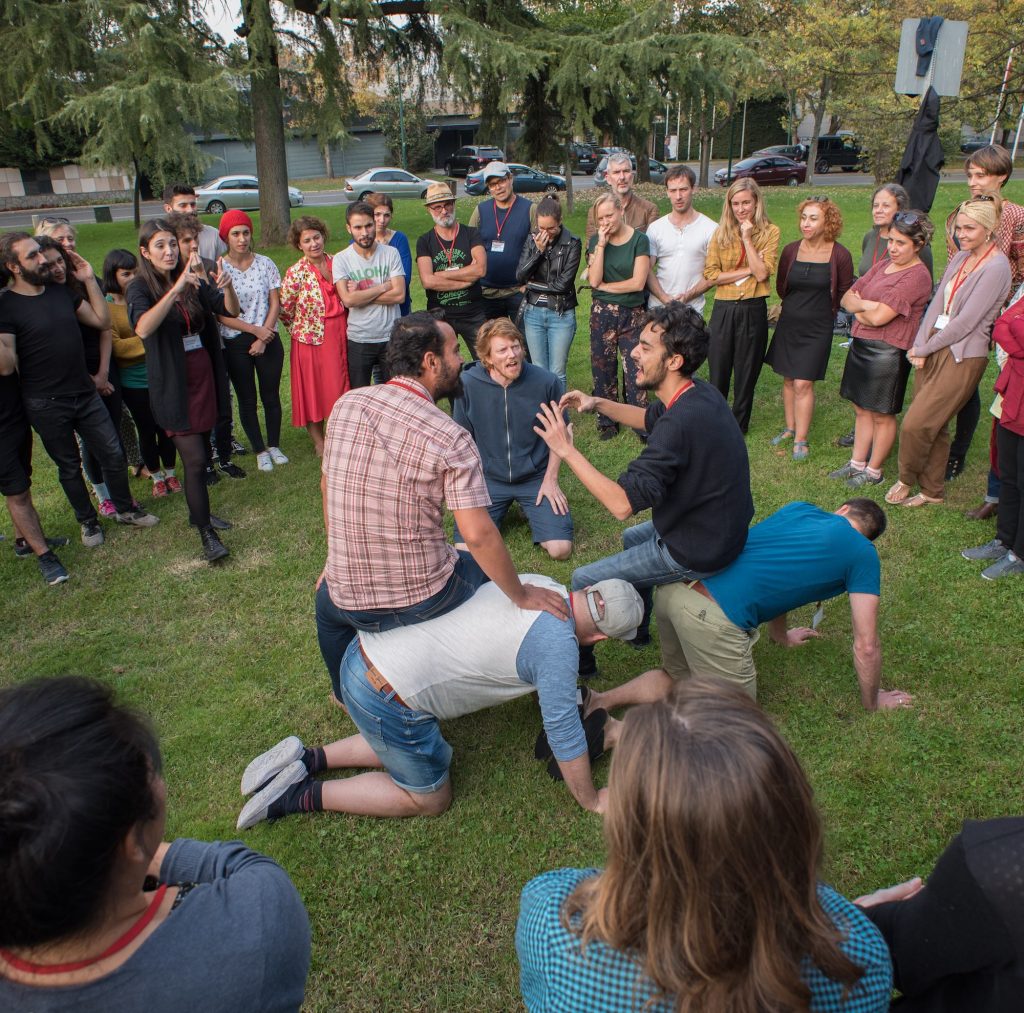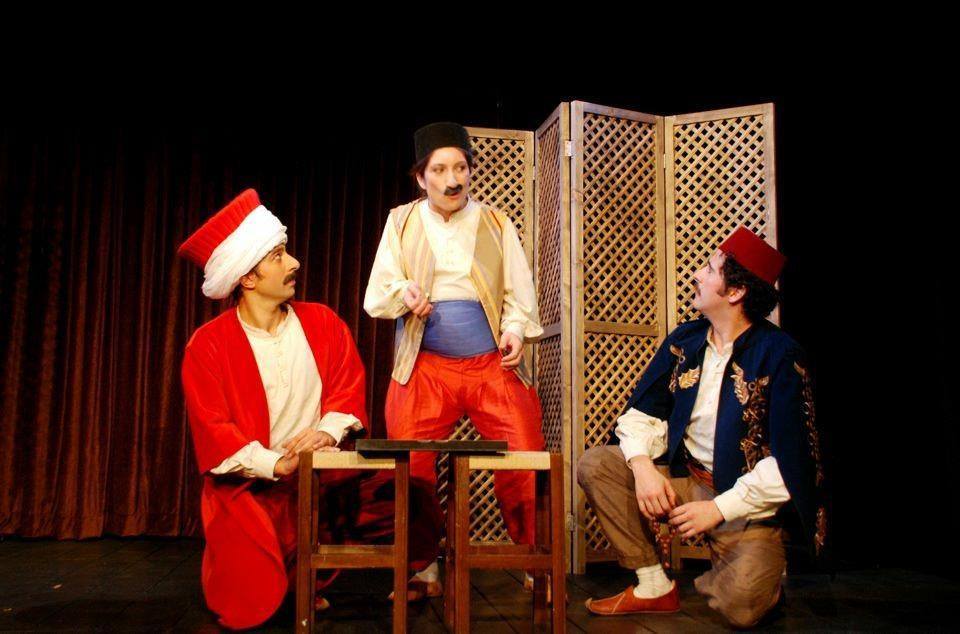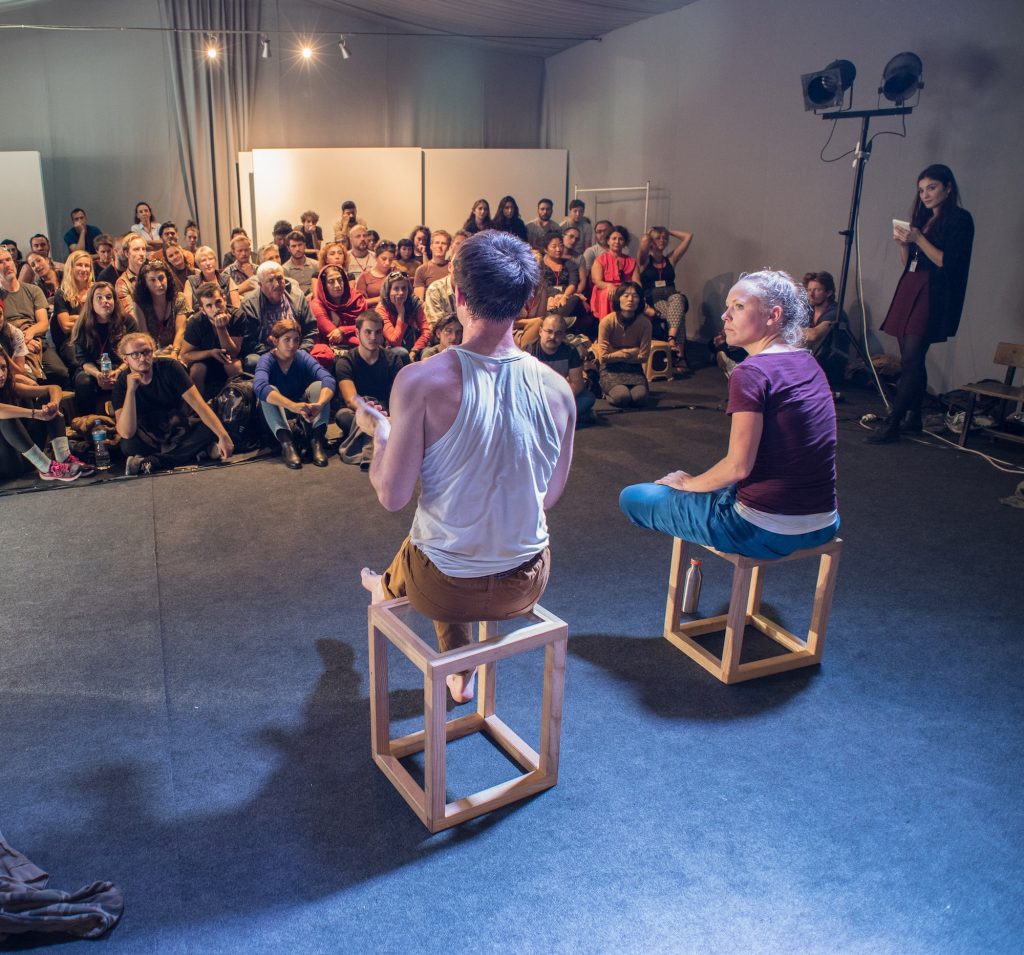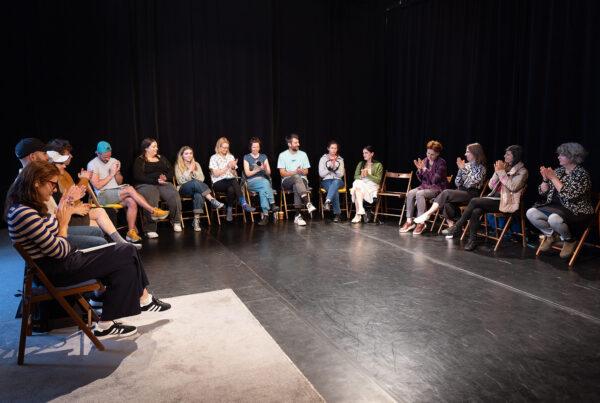By: Torben Stig Hansen
Many Turkish performing artists are interested in making children's theatre as in the Danish tradition, where the children are taken seriously and encouraged to be critical of the authorities. But how will that work in a country like Turkey, where traditional childhood education teaches the children to do what they are told without asking questions? This was discussed during the breaks at an Artistic Gathering in Bursa, where several of the contributing theatre professionals had experienced being punished by the Turkish authorities for interfering too much…

(Photo: Soeren Kloft) The audience acts all the parts in Nils P. Munks ‘Do vultures exist in Greenland?’ . On the picture İnanc Tartan gesticulates in a dramatic manner, with cues from Nils P. Munk in the middle, while Ceren Ozcan (to the left) translates.
"My passport has been confiscated by the state so I cannot leave the country. If only for this reason, it is very important to me that foreign theatre people visit Turkey," the 30-year-old actress Ceren Özcan tells me in a break when we, together with the gathering of Danish and Turkish performing artists, have left the meeting room to stretch our legs and grab a cup of tea. The Danish designer duo Sir Grand Lear has just given the participants a lively insight into the patchwork-like life as a freelancer, and in a few minutes, the room will be occupied by Boğaziçi Gösteri Sanatları Topluluğu, that is The Bosphorus Performing Arts Ensemble, which will present excerpts of four performances.
Drama teachers compared to terrorists
We are at an Artistic Gathering in the metropolitan city of Bursa south of Istanbul, where about 70 artists from primarily Turkey and Denmark exchange experiences and show each other excerpts of their work. The meeting is organized by fiery souls in Danish and Turkish ASSITEJ (the International Association for Performing Arts for Children and Young People) and was originally planned as a major theatre festival in Istanbul. But this project was dropped after Turkey's presiding president chose to crack down on more than a thousand academics from 89 Turkish universities – "Academics for Peace" – who had signed a petition to the Turkish state to treat the Kurdish civilian population properly. All signatories from Ankara University were dismissed without notice, including the then president of ASSITEJ Turkey, Professor Tülin Sağlam, who has taught at the University's Theatre Department for several decades, and Ceren Özcan: actress, drama teacher at the university and member of ASSITEJ.
"The president compared us with terrorists," says Ceren Özcan, "and he made several televised speeches, in which he called the entire academia a bunch of darkened pseudo-intellectuals."
Danish solidarity with Turkish theatre people
Thus, after two of the main forces in ASSITEJ Turkey had been stamped as terrorist sympathizers, fired from their jobs and deprived of their passports – just like 100,000 other Turkish people after the President's imposition of a state of emergency – the theatre festival became more difficult to go through with. But at the same time it was clear to the Danish and Turkish organizing teams that it was more important than ever to keep the international networking alive, and it was decided to arrange an Artistic Gathering in a more primitive framework and with no audience but the artists themselves. For this reason 30 Danish theatre people have travelled by air to Turkey with scanty scenography packed in suitcases – being aware that this gathering is not just a celebration of longstanding cooperation, but also an act of solidarity to their Turkish colleagues.
Children's theatre that takes children seriously
The rooms for the event are made available by the Bursa Culture Art and Tourism Foundation, which has organized an annual international children's theatre festival in Bursa since 1996 on the initiative of ASSITEJ Turkey. According to Professor Tülin Sağlam, the many visits by Danish performing artists have been a lasting inspiration for Turkish children's theatre. Since the 1960's Danish children's theatre has been at eye level with the children, ie. has been avoiding talking down to the children, and in a dramatic fashion dealing with topics they meet in their everyday lives. Performing arts which are not reluctant to deal with taboos, and which show the children that critical, anti-authoritarian thinking is an opportunity in their lives.
"At the first Bursa Festival, Turkey had no quality theatre for children, but today the level is fortunately more equal with other countries. However, the most widely used form of children's theatre is still far from being art," says Tülin Sağlam. And if you ask the other Turkish members of the congregation, they totally agree. According to them, today's typical children's theatre in Turkey is either didactic and is used as part of the school's education, usually for 400 children at the same time – or harmless, commercial entertainment.

(Photo: Deniz Aydın). Aysel Yıldırım in the middle as the Osman watchman, who surprises the dramatist Musahipzade Celal right in the middle of an act of orta oyunu (a prohibited theatre genre during the time of Sultan Abdul Hamid II), but who uninvited begins to imitate the famous figures. From B.G.S.T.s
performance ‘Musahipzade ile temasa’.
"The problem is the adults"
"Few people regard children's theatre as art," notes Ertan Akman, the director of Bursa Metropolitan Municipality Theatre. "Many actors tend to smile all the time, not to scare the children. And singing rabbits are always included, because both the children's and the adults' experience of theatre is limited to the colored animals of children's television. If, on the other hand, we show true love on the stage, the parents become uncomfortable and will stop taking the children to the theatre. Parents want to feel safe, and therefore, noone shows anything from real life to 'protect the children'. In short, the problem is the adults," says Ertan Akman.
Tülin Sağlam would like to correct that point of view.
"If the parents do not experience anything other than didactic and commercial theatre, they can not imagine the possibility that one can actually make serious performing arts for children and adolescents," she points out. "As theatre people, we have a great responsibility to realize that opportunity, and we must take that responsibility."
A future audience of curious spectators
Hacer Özbek endorses this point of view. She represents the Bursa Culture Art & Tourism Foundation, which has just organized and held the 22nd international children's theatre in Bursa. And she points out that the festival over the last three years has also brought performances and workshops to the 17 provinces around Bursa.
"People from the province do not come to town to see theatre. But in the Foundation we are actively working to create a future audience of curious spectators. That's why we bring the performing arts to them, "says Hacer Özbek. "The adults in the provinces do not know much about performing arts, but their children can help them understand. Children have a cleaner, clearer and more direct perspective, and often interpret a performance differently than their parents. When children see a show, they never forget it, and they remember a message of, for instance, solidarity for a long time," she points out.
Should you obey the powerful – or is it all right to ask questions?
After several conversations with Danish and Turkish theatre people, I find that there are two different approaches to making children's theatre, which may also reflect two different opinions among adults about what kind of persons children are. All children are born and grow up in a reality which is made by the adults. The question is whether children's theatre tries to educate them to adapt to the reality they have been served or, on the other hand, encourages them to question the reality in question. And the question is how or whether these two different opinions affect the children and have a lasting effect as they grow up and become citizens in the society. At the referendum in Turkey in April 2017, just over half of the population voted to give more personal power to the current Turkish president, instead of demonstrating a criticism of his dictatorial inclinations. Is this a result of the children's education? I ask Ceren Özcan.
"This country is conservative and there is no tradition of criticism. In fact, the criticism is left to the academics. That's why I loved my job at university – and why the president hates academics," Ceren Özcan says with a smile.
"In Turkey we have a tradition of obedience. Parents can of course educate their children in many ways, but the most common way is to make sure the child obeys the rules at home without asking questions. Our traditional children's theatre also tries to teach the children the 'right way'. And as citizens, we have a strong historical background for obedience to the powers, no matter what policy they are implementing. We need to overcome this obedient tradition. All areas of social life are interconnected in this mindset, and therefore they are difficult to change. But if you can change the way you consider a child, it should affect one's relationship with those in power, and vice versa. These habits do not disappear right away, but they change gradually every day," says Ceren Özcan.
Attended a demonstration and was deprived of state aid
An ensemble which is critical of power and in its performances makes fun of both the people in power and the tradition of obedience, is Boğaziçi Gösteri Sanatları Topluluğu (B.G.S.T). The ensemble has existed as a mix of actors, dancers and musicians since 1995, and in 2010 it was approved to receive an annual private theatre support from the Turkish Ministry of Culture. But in the spring of 2013, the government decided to clear Gezi Park – one of the few green areas in Istanbul – and instead restore a military barrack from the era of the Ottoman Empire. This resulted in demonstrations from a large part of the city's citizens, including members of B.G.S.T. and several other theatre groups, and soon millions of Turks rebelled against the government's reversal of secular values. Subsequently, B.G.S.T. was deprived of state aid with immediate effect. By way of justification, the Ministry did not state participation in the protests, but that the theatre no longer met the criteria for receiving support. Since B.G.S.T. could easily argue that they still met the criteria, the ensemble simply decided to sue the state for its unlawful decision. Since 2013, they have sued the state every year, but have still not been approved for private-party support. Frej Stenholt Mortensen and Loa Carlslund introduce their danceperformance ‘True Confusion’ a co-production between ZeBU and Theater Minsk.
B.G.S.T. also produces educational theatre for schools, which rather than teaching, they debate topics like censorship and freedom of speech, two of the actors, Aysel Yıldırım and Duygu Dalyanoğlu, tells me. The performance 'Musahipzade ile temasa' reports about the Armenian Güllü Agop, who is considered the founder of modern Turkish theatre, and who was contemporary with one of the last sultans of the Ottoman Empire, Abdul Hamid II. According to Aysel Yıldırım, it is well-known that Turkey's presiding president views this sultan as his role model. Just like Abdul Hamid II used the magnificent Yıldız Palace in Istanbul as his own home, two years ago the president decided that the Sultan's palace would function well as his presidential office. And just like Abdul Hamid II introduced extensive censorship in the country – forbidding ordinary writers to mention his name or the Yıldız Palace in their works – the current president is also pleased with the powerful tools of censorship. In B.G.S.T.'s story, Güllü Agop's ensemble makes a theatre performance for the Ottoman authorities, but during the performance it turns out that almost each line can be perceived as a reference to the Sultan or the Yıldız Palace, and the frustrated actors must make a lot of improvised digressions to avoid the insulting lines. The scene ends with Güllü Agop exclaiming: "Oh my God. If you want to create art in the Ottoman Empire, you have to be a tightrope walker…" B.G.S.T. presented the manuscript about Güllü Agop for the Turkish Ministry of Education, who, however, chose to censor the show and refuse to give it permission to perform at schools. The reason was that the particular scene with references to the Yıldız Palace could be perceived as an insult to the president. "It was quite comical to experience how history repeats itself, and how all autocrats make the same mistakes," Aysel Yıldırım comments.
Cross-border cooperation
After three packed days of performances, intense conversations and tea drinking, this ASSITEJ Artistic Gathering in Bursa is almost over. But a fresh Turkish-Danish cooperation has already gotten off the ground. In the bus to Istanbul, I talk to Allan Grynnerup, the director of Ishøj Theatre, who tells me that actor and director Erkan Uyanıksoy of Tiyatro BeReZe and MishMash International Theatre Company in 2018 is going to direct 'The Ugly Duckling' at Ishøj Theatre in a version that is going to deal with discrimination and integration.
"Cross-border collaborations are becoming more and more important," says Allan Grynnerup. "All over the world, the tension increases. Fear is brought to life and the unknown is suspected. There is a need for visions, insight and cooperation. Art and culture is a great meeting place that can give us that," he says.
Ceren Özcan couldn’t agree more:
"This ASSITEJ meeting has been so important. Here in this forum I feel comfortable enough to speak freely. The political situation in Turkey can not last forever, and I feel that the pressure on the powerful is getting stronger. Workers' Union of Academics still supports us and we have many supporters in the art world. I am full of hope. We are not alone. "
Torben Stig Hansen is a freelance journalist and managing director of The Batida Theatre Ensemble.




